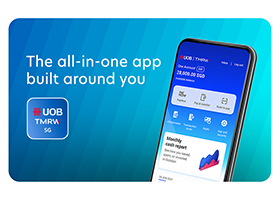You are now reading:
I am a first jobber: 3 steps I took to secure my financial future

Southeast Asia's first one-stop travel portal designed for UOB Cardmembers. Inspire, plan, and book your next adventure with UOB Cards.
Find out more
Skip to higher interest of up to 3.4% p.a. interest in just two steps. T&Cs apply. Insured up to S$100k by SDIC.
Find out more
Tap your way to 0% FX fees, cashback on MYR spend and instant savings with UNI$ redemption.
Find out more
Get instant cash at 0% interest and low processing fees. Choose from 3, 6 and 12-months tenor.
Find out more
Invest in funds powered by Private Bank CIO – United CIO Income Fund and United CIO Growth Fund.
Learn more
Meet UOB TMRW, the all-in-one banking app built around you and your needs.
Bank. Invest. Reward. Make TMRW yours.
you are in Personal Banking


You are now reading:
I am a first jobber: 3 steps I took to secure my financial future
Starting my career was an exciting adventure filled with new opportunities, responsibilities and a sense of independence. Earning my first paycheck was thrilling but transitioning from student to professional life was a steep learning curve with a host of financial challenges. Let me share some steps I took to manage my personal finances for long-termwi stability and growth.
One of the first mistakes I made was not creating a budget. Unexpected expenses – such as buying work attire, taxi rides, and after-work gatherings with colleagues – often took me by surprise. Without a budget, I found myself losing track of my spending and living paycheck to paycheck.
With a budget, I can now track my income, expenses and savings. Over time, I also accumulated six months’ worth of expenses as emergency funds. I now feel more secure about my finances especially if I lose my job unexpectedly.
Like many of my peers, I graduated with a student loan that requires regular repayments. Deferring payments can easily lead to increased debt from accumulated interest. It was essential for me to understand my repayment options and actively budget to lower my loan commitment. Whenever possible, I make extra payments to reduce my principal balance so that I can pay off my student loan more quickly.
Balancing loan payments with monthly living expenses can be tough. There is always the temptation to use credit cards for managing short-term cash flow – whether for dining out, shopping or to go on a holiday.
Credit cards offer convenience and the opportunity to build creditworthiness, but can also lead to significant debt if not managed wisely. It is important to understand how credit card interest rates work before rolling over debt.
I aim to spend within my budget and only charge what I can afford to pay off within the billing cycle.
I have come to realise that managing my finances requires a different set of skills from what I learnt in school. Understanding investing, insurance and retirement planning concepts can be overwhelming for a beginner. I research and read as much as I can and spoke to a financial advisor for personalised advice.
For now, my personal financial plan covers three main areas:
I am aware my plan will evolve over time as would my income and needs. This is why I make sure to set aside time for myself to review my financial plan every year.
The financial hurdles faced by young adults are very real and can be difficult to navigate without proper planning and discipline. However, I believe that with experience and a commitment to financial planning, these challenges can be overcome. By taking action now, I can pave the way to a more secure financial future for myself.
IMPORTANT NOTICE AND DISCLAIMERS:
This publication shall not be regarded as an offer, recommendation, solicitation or advice to buy or sell any investment product and shall not be transmitted, disclosed, copied or relied upon by any person for whatever purpose. Any description of investment products is qualified in its entirety by the terms and conditions of the investment product and if applicable, the prospectus or constituting document of the investment product. Nothing in this document constitutes accounting, legal, regulatory, tax, financial or other advice. If in doubt, you should consult your own professional advisers about issues discussed herein.
The information contained in this publication, including any data, projections and underlying assumptions, are based on certain assumptions, management forecasts and analysis of known information and reflects prevailing conditions as of the date of the article, all of which are subject to change at any time without notice. Although every reasonable care has been taken to ensure the accuracy and objectivity of the information contained in this publication, United Overseas Bank Limited (“UOB”) and its employees make no representation or warranty of any kind, express, implied or statutory, and shall not be responsible or liable for its completeness or accuracy. As such, UOB and its employees accept no liability for any error, inaccuracy, omission or any consequence or any loss/damage howsoever suffered by any person, arising from any reliance by any person on the views expressed or information in this publication.

19 Nov 2025 • 3 min read

26 Jun 2025 • 5 MIN READ

08 May 2025 • 3 min read

10 Mar 2025 • 4 min read